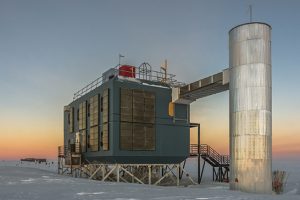
An astronomer at The University of Alabama is part of an effort to upgrade a massive cosmic particle detector.
Dr. Dawn Williams, UA professor of physics and astronomy, is part of the team that will upgrade the IceCube Neutrino Observatory, the Antarctic detector that identified the first likely source of high-energy neutrinos and cosmic rays.
Williams will coordinate enhancing the calibration of the detector, part of a project involving an international team of scientists working on the observatory, an array of 5,160 basketball-sized optical sensors deeply encased within a cubic kilometer of clear Antarctic ice.
The National Science Foundation approved funding to upgrade the IceCube detector, extending its scientific capabilities to lower energies and thus enabling IceCube to reach neutrino energies that overlap with the energy ranges of smaller existing neutrino detectors worldwide. The IceCube Upgrade project will introduce seven strings of optical modules at the bottom center of the 86 existing strings, adding more than 700 new and enhanced optical modules.
“The grant will facilitate upgrades that increase the sensitivity of the detector to low energy neutrinos and give us the opportunity to deploy new calibration devices, including LED light sources, cameras and acoustic sensors,” Williams said. “These new devices will give us detailed new information on the properties of the ice at the South Pole.”
The $37 million IceCube Upgrade, to be deployed during the 2022-23 polar field season, has now secured $23 million through an NSF mid-scale research award. Last fall, activities got underway, including setting up the IceCube Upgrade office, thanks to initial funding from NSF and additional support from international partners in Japan and Germany as well as from Michigan State University and the University of Wisconsin–Madison.
Learn more about the upgrade by reading the full article on the UA news site.